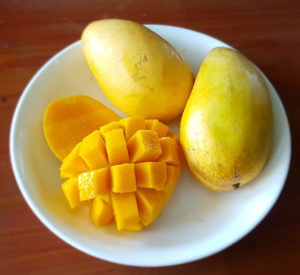There’s nothing more appealing than a beautifully ripe, delicious mango. This juicy stone fruit, which is a relative of the cashew and pistachio, is native to South Asia but is grown in many different parts of the world. Mangoes have been cultivated in Brazil, Bermuda, the West Indies, and Mexico because they all have appropriate climates for the mango’s growth. As its popularity increased, mango cultivation spread to most tropical and subtropical climates, with many mangoes coming from India and China. They are so beloved that they are the national fruit of India and Pakistan and the national tree of Bangladesh.
Mangoes are popular around the world because of their sweet, light, refreshing taste which mixes well with a variety of other flavors, including most fruits, especially strawberry, blackberry, and blueberry. A popular combination of strawberries and mango makes a refreshing drink when mixed with seltzer, fresh-squeezed lime, and ice. 
When fresh mango isn’t available, a good mango syrup can be invaluable. Refreshing drinks such as this Blackberry Mango Lemonade are quick and easy to put together at any time of the year. Even when mangoes are unavailable at your local market, you can still enjoy their tropical taste.
Blackberry Mango Lemonade
Ingredients
1?2 oz. Monin Blackberry Syrup
1?4 oz. Monin Mango Syrup
7 oz. lemonade
Glass: 16 oz.
Garnish: Berries, Lemon Wheel, Mint Sprig
Instructions
Fill serving glass full of ice.
Pour ingredients into serving glass in order listed.
Pour mixture into mixing tin and back into serving glass to mix.
Add garnish, straw, and serve.
Mango lovers will be happy to know that mangoes have a long harvest season, beginning in January and continuing until August with the peak harvest times being in May and June. When harvesting the fruit from its evergreen tree, be sure to leave a 4-inch stem at the top of the fruit. Sapburn can occur from a stem that is cut shorter than four inches and can cause damage to the fruit. Mangoes will continue to ripen for 3-8 days after they are picked. Mangoes ripen on the tree at different times which allows harvesters to “cut and come again” or pick ripe fruits and then come back later to harvest more as they ripen. A ripe mango will give slightly when gently squeezed and will have a fruity aroma around its stem.
There are hundreds of different varieties of mangoes and each has a unique color, taste, and size. Some varieties will turn red or blush as they ripen but others may not. It is more important to judge a mango by its feel, not its color. After you have chosen the perfect mangoes, they can be stored at room temperature for up to five days if they are ripe. Unripe mangoes should not be stored in the refrigerator. Once ripe, they can be stored in the refrigerator for up to five days. Mangoes can also be frozen whole or after they have been skinned and cut into pieces. Frozen mangoes can be used to make purees or added to smoothies. Pureed mangoes also make a wonderful first baby food either alone or mixed with baby cereals.
Mangoes aren’t just a delicious, tropical mixer but are packed with nutritious vitamins and antioxidants as well. Healthline lists many of a mango’s nutrition and health benefits. According to the article, mangoes:
- are low in calories
- are packed with vitamins and antioxidants
- help your body absorb iron
- contain over a dozen different types of antioxidants, including quercetin which has anti-inflammatory properties that can help with everything from controlling blood sugar and allergies to preventing heart disease. They contain mangiferin which has been called a “super antioxidant” because of its potency in fighting free radicals and protecting heart cells.
- contain almost 70% of the recommended daily intake of vitamin C which can help boost immunity
- contain water, fiber, and amylases which help to break down complex carbohydrates, all of which help digestion
- contain the antioxidants lutein and zeaxanthin which promote eye health and protect eyes from harmful blue light.
- contain vitamin A which supports eye health
With their light, refreshing flavor and bountiful list of vitamins, minerals, and antioxidants, it’s no wonder that mangoes have been a popular, healthy snack for over 4000 years.